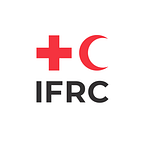Saving lives in silent disasters
Deadly heatwaves, floods, drought, mass population movements across borders… Every year, a wide range of emergencies strike countries across Europe — but many remain unseen. Red Cross and Red Crescent teams ensure those in need can get help
A timely and quality humanitarian response is crucial to save lives, minimise suffering and reduce socio-economic losses. However, many ‘invisible’ emergencies draw little attention and financial support.
“Small and medium-sized disasters don’t often make headlines on international media, but affected people may struggle to cover pressing needs if the aid community struggles to get funding to assist them,” said Andreas von Weissenberg, Head of the Disasters, Climate and Crises Unit for Europe at the International Federation of Red Cross and Red Crescent Societies (IFRC).
To provide immediate assistance in these situations and help communities recover and prepare for future hazards, the IFRC rapidly channels funding to teams on the ground through its Disaster Relief Emergency Fund (DREF), as this enables them to deliver fast and effective local humanitarian action.
Drought, floods and conflict
In 2021, amid the COVID-19 pandemic, the Europe region has been stricken by multiple ‘silent’ disasters, with Red Cross Red Crescent staff and volunteers at the forefront of relief efforts. The IFRC has released 2.8 million Swiss francs to provide emergency relief to over 45,000 people since the beginning of the year — from basic necessities, healthcare, shelter and livelihood support to assistance for disaster preparedness.
Over the last six months, for example, three Central Asian countries have dealt with emergencies mainly unnoticed at the international level, which left thousands of people in need of help:
In Kazakhstan, a prolonged heatwave caused a severe drought and killed thousands of farm animals in July, leaving many without livelihoods. Local Red Crescent teams assessed people’s needs in Mangystau and Turkestan regions, and offered cash assistance to 5,750 people thanks to IFRC’s DREF.
Before that, in May, heavy rains caused devastating floods and landslides in Tajikistan, which is recurrently affected by this kind of disaster. The IFRC released more than 226,000 Swiss francs from the Disaster Relief Emergency Fund to assist local Red Crescent teams in helping 1,785 affected people with first aid, evacuations, shelter and psychosocial support.
At the same time, tensions between the residents of Batken province and neighbouring Sughd province in Kyrgyzstan escalated into an armed conflict resulting in almost 40 people killed, more than 150 injured and displacement of thousands of people. With over 337,000 Swiss francs from the DREF, the IFRC helped the Red Crescent Society of Kyrgyzstan distribute cash assistance for 6,000 people to meet their immediate needs, such as replace lost/looted household items, repair materials for their houses and cover other essential costs. The support also enabled local teams to continue providing emergency shelter and other household items, hygiene kits, first aid kits, as well as psychosocial support.
“Too much smoke and flames. We had to escape”
During the summer, the Mediterranean region experienced its worst heatwave in decades. Wildfires burned large areas in several countries. Largest disasters led news bulletins across Europe, but in some other cases humanitarian needs exceeded available resources and required additional funding.
That happened in North Macedonia, where high temperatures resulted in wildfires that devastated forests, fertile land, crops and properties, leaving one people dead and several wounded. The government declared a countrywide state of crisis, and IFRC supported local Red Cross teams with nearly 500,000 Swiss francs to help more than 12,000 families.
Assistance included basic relief items such as drinking water and hygiene kits, healthcare including psychosocial support through five SOS hotlines, awareness raising materials and COVID-19 tests. In addition, staff and volunteers distributed food among the firefighters.
“The wind brought the fire here, and we couldn’t extinguish it. Too much smoke and flames. We had to escape. I didn’t take anything. I couldn’t even take my documents. I sat in my tractor and left,” said a man who survived the wildfires and received assistance from local Red Cross teams.
In Sardinia, Italy, wildfires forced the evacuation of 1,500 people and destroyed 20,000 hectares of crops. Thanks to the support provided by IFRC’s DREF, with more than 208,000 Swiss francs, Italian Red Cross teams could deliver assistance to 200 families of about 100 farms, mainly owners and workers in the affected areas over a period of four months. They offered support primarily on livelihoods and shelter, with distribution of fodder for cattle and through vouchers to cover basic needs.
Sudden migration flows
Other emergencies where increased assistance is sometimes needed at the shortest delay are sudden migration flows to different countries. That was the case in Lithuania, as over 4,000 people crossed from Belarus in three months — about 40 times more than compared to the same period of 2020.[i]
Similarly, a relaxation of COVID-19 restrictions in May caused an influx of people from Syria to Cyprus by boats and also through other routes, causing enormous pressure to the already overcrowded national reception system. In both situations, IFRC released over 338,000 and 246,000 Swiss francs, respectively, to help local Red Cross teams in providing humanitarian assistance to more than 9,000 people in total.
Volunteers, at the heart of relief efforts
These are just some recent examples of the assistance provided by the Disaster Relief Emergency Fund.
Across Europe, thousands of volunteers are often the first responders when a disaster strikes, and the IFRC enables them to be where it is needed most. The Disaster Relief Emergency Fund (DREF) is the quickest, most efficient and most transparent way of getting funding directly to local humanitarian actors — both before and immediately after a crisis hits.
Whether it be a climate-related disaster, migration or conflict related, acting fast is vital to save lives and help communities build back better.
Story by Ainhoa Larrea, IFRC
[i] https://ifrc.medium.com/lithuania-helping-vulnerable-migrants-and-refugees-777b1042edff
